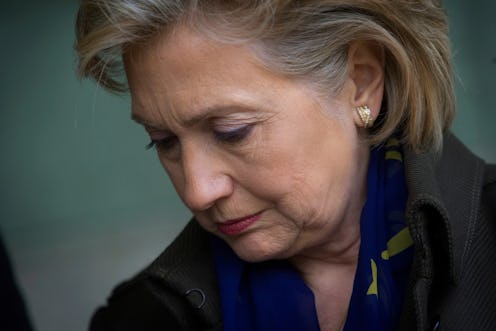News
Clinton Supporters Shouldn't Be Too Excited Yet
The Associated Press named Hillary Clinton the winner of the Democratic presidential primary early Monday evening, hours before polls had even opened in California or New Jersey — two states whose pledged delegates were expected to push the former secretary of State to the threshold required to clinch the party's nomination Tuesday. But it wasn't pledged delegates who secured Clinton as the reported presumptive nominee a day earlier than anyone expected, it was superdelegates.
Until Tuesday's primaries, Clinton's title as the presumptive Democratic nominee is entirely dependent on so-called superdelegates, party officials who are able to exercise their own free will when it comes to voting at the Democratic National Convention. In contrast to pledged delegates, who are bound to a candidate in accordance to the results of their state's caucus or primary, superdelegates are welcome to change their minds and their vote in the lead up to the nominating convention. This makes counting superdelegates before they've actually voted a bit more complicated than the media makes it sound.
Sen. Bernie Sanders' campaign argued Monday's announcement was a case of the media counting chickens before they'd hatched, in a statement put out shortly after AP named Clinton the presumptive nominee. "It is unfortunate that the media, in a rush to judgement, are ignoring the Democratic National Committee's clear statement that it is wrong to count the votes of superdelegates before they actually vote at the convention this summer," the Hill reported Sanders' spokesman Michael Briggs said.
As far as Sanders is concerned, Hillary may have enough eggs in her coop now, but that doesn't guarantee her the required number of votes in Philadelphia come July.
According to AP's most recent tally, an additional 24 superdelegates have committed to casting a vote for Clinton in July, bumping her from 547 to 571 superdelegates. Sanders also gained some superdelegate support, according to the AP's count, inching from 46 to 48 superdelegates. Clinton is estimated to have 1,812 pledged delegates following wins in the Virgin Islands and Puerto Rico over the weekend with Sanders trailing behind with 1,521.
Despite trailing Clinton by nearly 300 pledged delegates and more than 500 superdelegates, Sanders continues to appear optimistic that he can flip enough superdelegates before the official vote is taken at the Democratic National Convention on July 25. "Secretary Clinton does not have and will not have the requisite number of pledged delegates to secure the nomination," Briggs said. "She will be dependent on superdelegates who do not vote until July 25 and who can change their minds between now and then."
While it is true that superdelegates are free to commit and uncommit to a candidate as they see fit, the question for Sanders is not necessarily will they change their mind, but will they change their mind en mass. Flipping enough superdelegates to close the gap existing gap between himself and Clinton is no easy task. In fact, it's downright mountainous. There's no historical precedent for the kind of massive superdelegate switch Sanders needs to win the nomination. In 2008, NBC News estimates no more than 30 superdelegates flipped from Clinton to the eventual nominee Barack Obama.
Despite the herculean task, Sanders is technically correct when he says superdelegates can change their minds about him on the floor of the Democratic National Convention. Weirder things have happened in this unpredictable presidential primary so perhaps it is best not to rely so heavily on votes yet to be cast.
